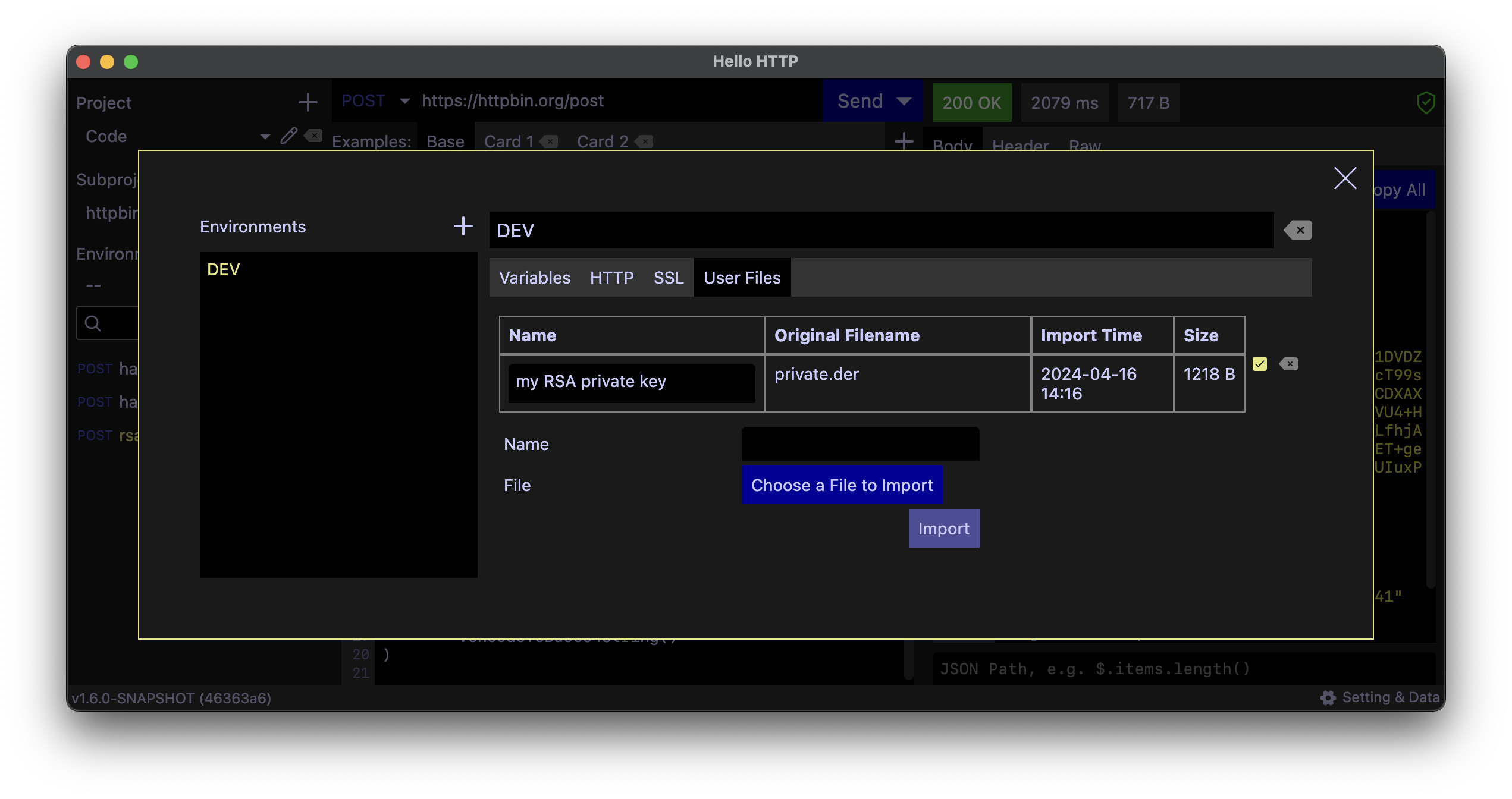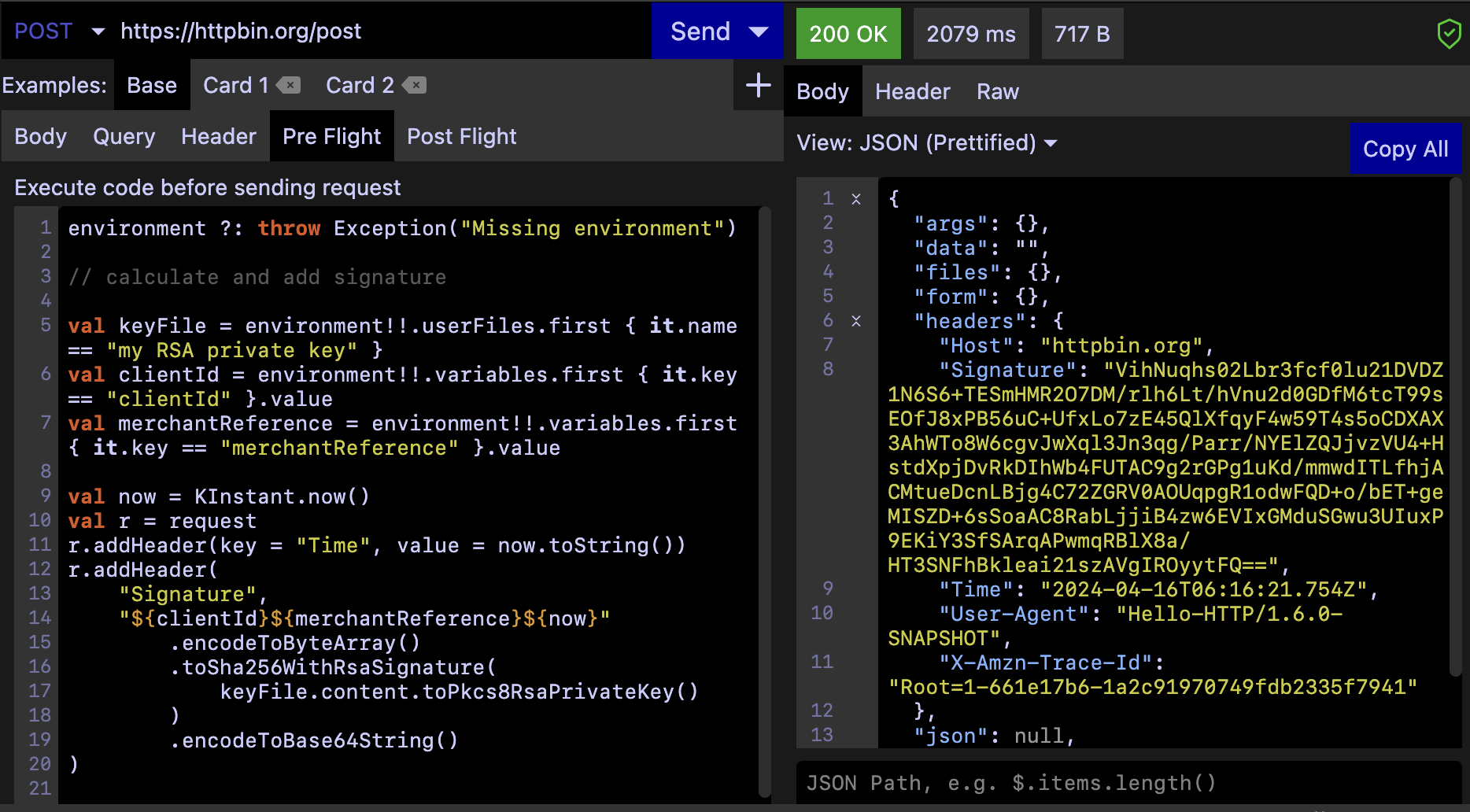User Script
Hello HTTP allows the use of custom script to perform a limited set of operations that are not possible or difficult to do via the UI. The supported programming language is Kotlite, a subset of the Common variant of the Kotlin 1.9 script language. Script means it does not require a main function and the statements at the outermost scope will be executed sequentially.
It is not quite possible to do anything harmful by user scripts, because both the language and the APIs available to be used are limited. For example, it is not possible to make another HTTP request directly from the script, nor modify the URL of the current script, nor execute system commands. There is also a short time limit on execution.
An example use case of user scripts is to generate some hash or signature with some encryption keys and embed into a request before sending it.
Providing custom files for user script use
Files can be imported into an Environment to be consumed by user script. Only small files can be imported. They would be included into data dump files.

Names can be changed after importing.
Pre-flight Script
Custom pre-flight script can be provided to a request example. It would be executed before firing the request.
It is only available for:
- Plain/RESTful HTTP requests
- GraphQL requests
Similar to other request example properties, the script in the "Base" example can be overridden by other request examples.

The only supported mutation operations are:
- append headers
- append query parameters
All APIs in the standard library can be used.
In additional, below inputs and APIs are available as follow.
Global Properties
/**
* Request object.
*
* @param <BODY> One of `Nothing`, `StringBodyClass`, `FormUrlEncodedBodyClass`, `MultipartBodyClass`, `FileBodyClass`, `GraphqlBodyClass`.
*/
val request: MutableRequest<BODY>
/**
* The environment chosen to be active. Null if there is none.
*/
val environment: Environment?
Types
Request
class Request<BODY>
val Request<*>.url: String
val Request<*>.method: String
val Request<*>.headers: List<Pair<String, String>>
val Request<*>.queryParameters: List<Pair<String, String>>
val <BODY> Request<BODY>.body: BODY?
/**
* Get a properly encoded URI embedded with query parameters.
*/
fun Request<*>.getResolvedUri(): String
/**
* Get variables merged from the selected environment, the base request example and the selected request example.
*/
fun Request<*>.getApplicableVariables(): Map<String, String>
fun Request<*>.getApplicableCookies(): Map<String, String>
MutableRequest
class MutableRequest<BODY> : Request<BODY>
fun MutableRequest<*>.addHeader(key: String, value: String)
fun MutableRequest<*>.addQueryParameter(key: String, value: String)
Environment
class Environment
val Environment.name: String
/**
* Environment variables. Only enabled variables are available.
*/
val Environment.variables: List<UserKeyValuePair>
/**
* User files. Only enabled user files are available.
*/
val Environment.userFiles: List<ImportedFile>
UserKeyValuePair
class UserKeyValuePair
val UserKeyValuePair.key: String
val UserKeyValuePair.value: String
/**
* Either "String" or "File".
*/
val UserKeyValuePair.valueType: String
/**
* If valueType is "String", return the bytes of the String value.
* If valueType is "File", return the bytes of the underlying file, or null if no file is selected. Exception would be thrown if a file is specified and cannot be read.
*/
fun UserKeyValuePair.readValueBytes(): ByteArray?
StringBody
class StringBody
val StringBody.value: String
FormUrlEncodedBody
class FormUrlEncodedBody
val FormUrlEncodedBody.value: List<UserKeyValuePair>
MultipartBody
class MultipartBody
val MultipartBody.value: List<UserKeyValuePair>
FileBody
class FileBody
val FileBody.filePath: String?
/**
* Return the bytes of the underlying file, or null if no file is selected. Exception would be thrown if a file is specified and cannot be read.
*/
val FileBody.readBytes(): ByteArray?
GraphqlBody
class GraphqlBody
val GraphqlBody.document: String
val GraphqlBody.variables: String
val GraphqlBody.operationName: String?
ImportedFile
class ImportedFile
val ImportedFile.name: String
val ImportedFile.originalFilename: String
val ImportedFile.createdWhen: KInstant
val ImportedFile.content: ByteArray
PublicKey
class PublicKey
PrivateKey
class PrivateKey
SecretKey
class SecretKey
Extensions
Encoding
fun ByteArray.encodeToBase64String(): String
fun ByteArray.encodeToBase64UrlString(): String
fun ByteArray.encodeToHexString(): String
fun String.decodeBase64StringToByteArray(): ByteArray
fun String.decodeBase64UrlStringToByteArray(): ByteArray
fun String.decodeHexStringToByteArray(): ByteArray
fun String.decodeJsonStringToMap(): Map<Any?, Any?>
Crypto
fun ByteArray.toSha1Hash(): ByteArray
fun ByteArray.toSha256Hash(): ByteArray
fun ByteArray.toSha512Hash(): ByteArray
fun ByteArray.toMd5Hash(): ByteArray
fun ByteArray.toSha1WithRsaSignature(rsaPrivateKey: PrivateKey): ByteArray
fun ByteArray.toSha256WithRsaSignature(rsaPrivateKey: PrivateKey): ByteArray
fun ByteArray.toPkcs8RsaPublicKey(): PublicKey
fun ByteArray.toPkcs8RsaPrivateKey(): PrivateKey
fun ByteArray.toAesSecretKey(): SecretKey
/**
* Example value of parameter `algorithm`: "AES/CBC/PKCS5Padding"
*/
fun ByteArray.asEncrypted(algorithm: String, key: SecretKey, iv: ByteArray? = null): ByteArray
fun ByteArray.asDecrypted(algorithm: String, key: SecretKey, iv: ByteArray? = null): ByteArray
Powered by Doctave